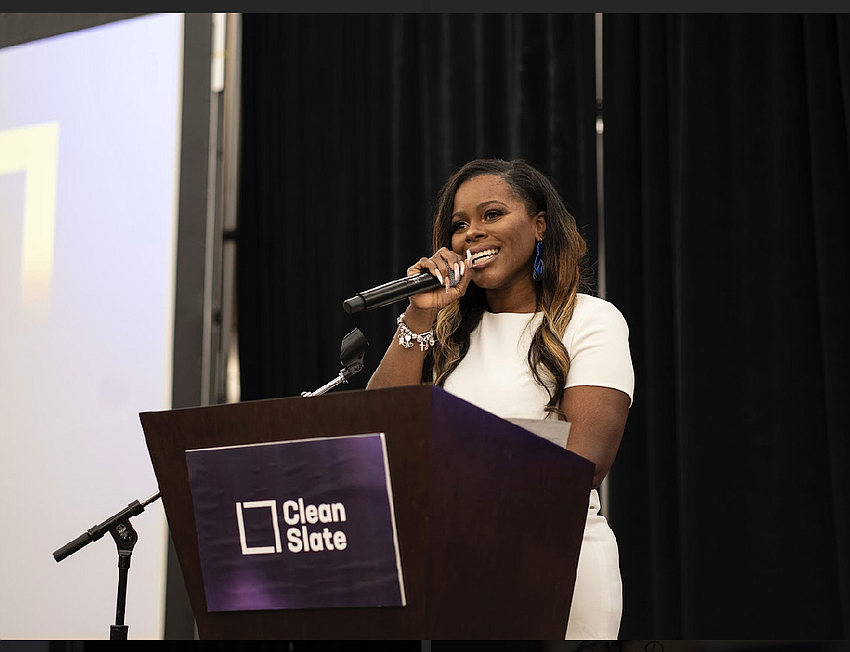- March 28, 2025
-
-
Loading

Loading

Sheena Meade was a single mother with four young children under age 5 when she was arrested in 2004 for bouncing a check for $87.26.
“I had two cops knock on my door … and they arrested me for a check I wrote at Walmart for groceries and it bounced,” Meade said. “I was arrested for trying to feed my children.”
That arrest remains on her criminal record today, and she still is working to get her record cleared. This has led her on a path of record restoration — not only for herself but for thousands of other previously incarcerated men and women.
Meade is the CEO of The Clean Slate Initiative, legislation that would require states to take on the responsibility of navigating the process of having folks’ criminal records cleared.
“It started in 2018 in Pennsylvania when some advocates and lawyers came together and realized that people could not get jobs because their record was holding them back,” she said. “And it might be from years back and they have good employment, paid their debt to society, and they wanted to move on. Their record was defining who they were.”
She joined the initiative in 2020 and has been able to help six states pass Clean Slate laws, which resulted in more than two million people getting their records cleared, she said. Florida has yet to pass these laws — and until this happens, Meade cannot get her own record cleared.
Her husband is Desmond Meade, a voting rights activist and executive director of the Florida Rights Restoration Coalition. He helped 1.4 million people get their voting rights restored, and this sparked Sheena Meade’s passion with Clean Slate.
“We’re both doing things to help people move forward in second chances,” Sheena Meade said.
POSSIBILITY AWARDS
At the TED2023 Possibility Awards Monday, April 17, Clean Slate was revealed as a 2023 grantee of The Audacious Project and will receive $75 million to implement her plan.
More than 30 million Americans are eligible for record clearance, yet fewer than 10% have successfully been able to access it, Meade said. The Clean Slate Initiative is a bipartisan movement that shifts the burden off the individual, streamlines this complicated process and increases access to justice for millions.
According to Meade, one in three Americans have a record, a majority of them for arrests, acquittals and non-violent misdemeanors like excessive speeding.
But even after paying their debt to society, they don’t get a second chance because the record hasn’t been cleared, Meade said. Ninety percent of employers, 80% of landlords and 60% of colleges and universities use background checks to screen out applicants with records.
“I went to Oklahoma to meet with some of the people in the community, and there was a lady who … was doing cosmetology in prison,” Meade said. “She was trying to wash hair and stuff. You could not wash hair if you had a record in Oklahoma. In Florida, you need an occupational license to wash hair. … These are things people face.
“April is Second Chance Month, and I believe America is a second-chance country,” she said. “People who are crime free, have paid their debts to society — allow them to get their records cleaned.”
Clean Slate automates the process of doing just that.
“We’re removing the burden form the person who made the mistake to the system that traps them in the mistake,” Meade said. “It’s no longer a self-initiated process.”

STREAMLINE THE PROCESS
The Audacious Project website, in introducing The Clean Slate Initiative, wrote: “In most states, individuals have to keep track of when they are eligible for record clearance — a status that typically comes after a period of remaining crime free, for certain types of records. Then to actually get the record cleared, they are required to navigate a complex and costly petition-based process on their own. Few are successful.”
The idea behind the legislation is to streamline the process by requiring that records be cleared automatically when individuals become eligible.
The Audacious Project outlined the Clean Slate plan: The team is enacting a 50-state strategy to increase access to record clearance for more Americans. In six states where Clean Slate legislation has recently passed, they will focus on enabling implementation. They also will work in 23 states with favorable environments, engaging in multi-year campaigns to pass legislation. And in 19 states where the environment isn’t as favorable, they will begin groundwork, creating the conditions to pursue campaigns in the future.
In each state, the Clean State Initiative will work with bipartisan leaders and organizations and offer its expertise on what works: smart policy design, an eye toward implementation from Day 1 and campaign strategy that centers lived experience. Along the way, they will redefine the narrative around people with records, cutting through the bias and stigma, to reorient the criminal justice system to live up to the ideals of second chances.
“I’m a person of faith; God uses people,” Meade said. “He will transform my pain to purpose by helping other people who might have their own barriers and are trying to change their lives.”
Meade knows firsthand what it’s like to be held back. When she and her husband were trying to find a home in Orlando, they realized they had the resources and the credit but still were being denied because of her record.
“The records shouldn’t define who we are now,” Meade said.
Part of the current problem is it costs money to pursue getting the record cleared.
“If your crime was being poor, you can’t afford to go through the process,” she said.
SO MANY STORIES
Meade recently returned from Michigan, where the Clean Slate law is being implemented and where she met many people who still are paying for their mistakes from 20 years ago. One woman said she continually scored at the top of hire lists when she applied for jobs but she was unable to get the job each time because of her felony record.
“I could no longer volunteer in the lunchroom at my kids’ school,” the woman told Meade. “It had nothing to do with kids or engaging with kids.”
Meade had a similar story.
“When my youngest son, who is 15 now, was going to elementary school, he wanted to go on a SeaWorld trip, and I went to volunteer to sign up, and I went to hit the button, it said, ‘Have you ever had a felony?’” Meade said. “I’m not going to lie on here. But (if I click yes) are they going to stigmatize my children, put me to shame?
“A lot of the stuff we are clearing, these are nonviolent low-level crimes,” she said. “We’re not talking about people who were convicted of murder or sexual offenses. The biggest thing is … these are offenses that the government has already said, ‘This person is rehabilitated and crime free,’ and we say they should be eligible.”